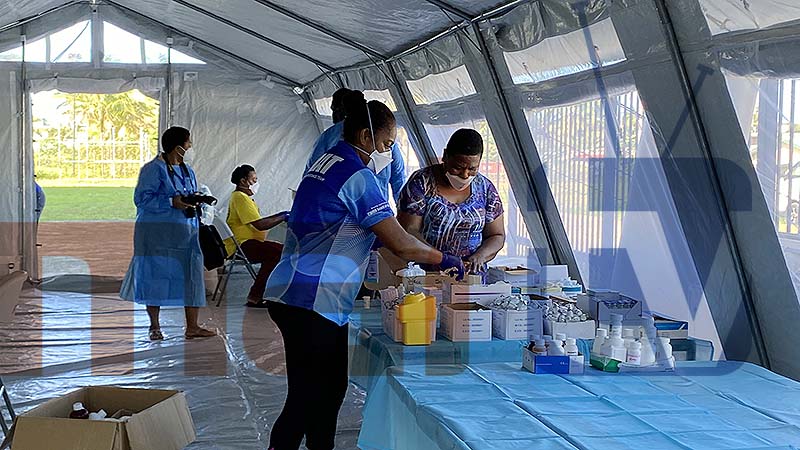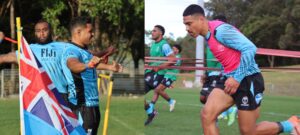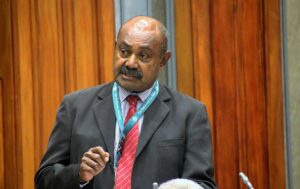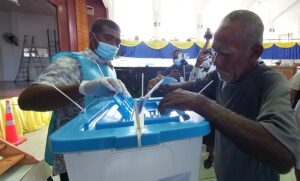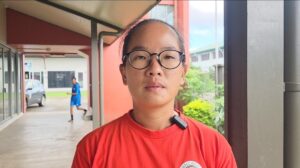Fiji’s health officials anticipate positive case numbers to decrease as a result of prioritised testing, but say it must be done to identify and treat at the earliest high-risk COVID individuals adding that there are other avenues to gauge the extent of transmission in the community.
Regarding the impact of its decision to restrict testing in the Suva-Nausori corridor, Permanent Secretary for Health Dr James Fong told Mai TV that other indicators such as the proportion of pregnant women that go into labour testing positive are but some yardstick that the ministry uses to gauge the country’s COVID-19 status.
“And we are having close to 40% of our women coming into maternity unit, that is positive for COVID-19, to deliver. So that gives us another indication that yes, out in the community, there’s still a high level of these. So, we will not be using the number of test positives per day as an indicator of how bad the problem is, for us, we will be using the number of admissions, for maternity – the number or percentage of women that are positive when they come into labour. Those are the kinds of things that we will be using.”
Fiji’s Head of Health Protection Dr Aalisha Sahukhan said the decision to prioritise testing is part of their mitigation approach to prevent further loss of lives as has been the case recently.
In the early days of the outbreak, rapid testing was done as part of its containment approach where the objective was to test people, find them quickly, identify them as cases to isolate and quarantine their contacts, consequently reducing its spread.
“We were doing that extensively right in the beginning. And then, even up until just a few weeks ago where we were actually sending teams out into neighbourhoods and swabbing people even if they had no symptoms because we just wanted to find cases and isolate them and try to stop the transmission.”
Dr Sahukhan said if the ministry were to maintain that approach – to keep testing everyone and monitor all as it did in the early days, they will miss out on people who really need to have that monitoring and will benefit from that test result.
Of the 170 deaths recorded in Fiji since the outbreak started in April, 92 were announced last week alone – 65 more than the previous week.
“We’re trying to identify those people with a severe disease so that we have a chance of treating them and saving them so we’re doing exactly the same thing that we’re doing right now, for COVID-19, and we’ve seen this happened, all across the world in over a year of this pandemic similar mechanisms have been put in place to try and help these people with severe disease.
“It’s not ideal, I know that, but honestly, we are really doing the best we can to at this point with trying to save lives. But as we going into this phase, Suva-Nausori we have to prioritize who we test. Because what we’re seeing now is more people coming in with severe disease, needing hospitalisation and death. So for those people identifying them quickly, is more important for us, than finding the people who have mild disease.
Dr Aalisha Sahukhan
“There may be people in the younger age groups who don’t have comorbidities. And we know that with COVID-19, the majority of people who get the disease will have mild symptoms, and they will recover after about 14 days. So if you test a person who’s in their 30s who has no or no chronic illness, and they recover after 14 days, the value of the test is just that you can tell them yes you definitely have COVID-19, but we still saying to the person, isolated home self isolate you know take Panadol if you have pain or fever. The treatment is exactly the same.
So now what we’re saying to people who don’t fall into those severe, severe risk groups or high-risk groups, is if you are in Suva Nausori and you develop flu-like symptoms like cough or runny nose, it’s very likely you have COVID, and the test is just going to tell you what we already know. The treatment does not change you stay home. You take Panadol you take fluids, you know, and, I know a lot of people who had COVID, and they’ve done this at home and the only thing you do is you watch out to see if you develop any of the severe disease symptoms or you start getting short of breath, started getting chest pain, then we want you to come in as soon as possible.
“Where the testing really matters, is for the people who have those chronic illnesses who have non-communicable diseases like heart disease and renal failure, kidney failure, asthma, pregnant women, we know that we need to test them quickly get the results quickly put them onto our list of people that we are following up, or that we need to admit into intermediate care facilities like this, so we can monitor them more closely. “
Dr Aalisha Sahukhan



